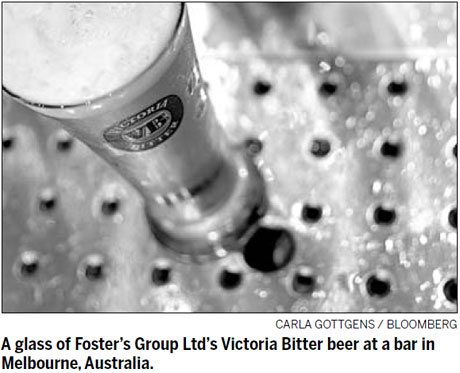Foster's eyes brand diversification

MELBOURNE, Australia - Foster's Group Ltd, Australia's biggest brewer, expects to make more beers such as Big Helga and Fat Yak to tap demand for brews made using traditional methods and ingredients as consumers turn away from mainstream brands.
"You will find explosive growth, underlined, in the craft segment," Peter Sinclair, marketing director for the company's Australian beer unit, CUB, said in an interview. "Without a doubt the trend toward premium beers is going to continue."
The drink lineup is part of a push to compensate for falling sales of top-selling beer Victoria Bitter and declining profits at the Melbourne-based company's wine unit. Brewing accounted for 85 percent of Foster's earnings in the company's most recent first half and 55 percent of revenue.
So-called craft brews and low-carbohydrate beers are among the fastest-growing segments of the nation's A$13.5 billion ($12.1 billion) beer market, according to researcher Euromonitor International.
"Foster's needs to be putting their attention into the things that make money and that is what they are doing," said Theo Maas, who helps manage $4.5 billion in assets at Fortis Investment Partners in Sydney, including beverage stocks. "They have a problem child with managing VB's market share but they are trying to address that by driving customers to premium."
Foster's shares rose 2 cents, or 0.4 percent, to A$5.36 at the close of trading on the Australian Securities Exchange. The stock has fallen 2.6 percent this year and has posted two annual gains since 2001.
Premium beer
The trend toward premium beers such as craft brands benefits brewers and helps limit the impact of a stalling market because production costs are similar to traditional labels while higher selling prices lift profitability.
The Australian beer market is expected to decline 2.2 percent by 2014 compared to 2009 data, Euromonitor says. Premium lager sales will increase by at least 5 percent annually by then to represent 30 percent of the market compared with a 16 percent share in 2004.
"Premium beer remains a strong growth area and this is projected to continue," Euromonitor said in a report this month.
Foster's is already one of the most profitable brewers in the world. The company posted a profit margin, which measures earnings before interest and tax as a proportion of revenue, of 24 percent in the six months ended Dec 31.
That compares with 25.8 percent at Anheuser-Bush InBev NV, 15.5 percent at SABMiller Plc and 5.6 percent at Kirin Holdings Co.
Chief Executive Officer Ian Johnston is focusing on beer and a market where he controls 50 percent of sales as earnings from his wine business shrink on discounting and a rising Australian dollar makes his products more expensive overseas.
The company decided to keep the wine business, the world's second-largest, as it tries to revive the division it spent a decade and A$6.8 billion creating.
Next month John Pollaers, a former executive with Diageo Plc, will become managing director of CUB, replacing Alex Stevens who resigned in December for health reasons.
Lion Nathan, with brands such as Tooheys and Hahn, is the biggest competitor to Foster's. The brewer, which is owned by Tokyo-based Kirin, had 38 percent of retail beer sales in 2009 while Foster's had about 50 percent, according to a March 2 report by Ian Abbott, an analyst at Goldman Sachs JBWere Pty, who cited Nielsen data.
To tap shifting consumer tastes, where the beers drunk at home are different to those chosen in bars, Foster's has added brews in at least three categories in the past decade. These include low-carb Pure Blonde, lime-flavored Carlton Dry Fusion, and Fat Yak and Big Helga in the craft segment.
Sinclair expects more in the future, but he wouldn't elaborate as they are still at the development stage.
Bloomberg News
(China Daily 03/06/2010 page10)








